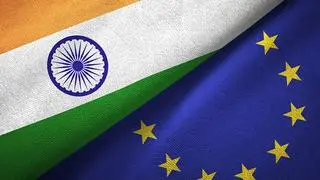With camera mobile phones having become ubiquitous, information today travels rapidly and consequently, those in power no longer have control over flow of information.
While technology has made life a lot easier, but for those with power – such as governments and companies – it has made ‘power' vulnerable, fragile and brittle, says Mr Nik Gowing, Presenter, BBC World News .
“Public information space has been turned on its head,” Mr Gowing said. The well-known BBC presenter today visited the office of The Hindu group of publications here.
He observed that governments were still in denial mode. “Majority in the governments and corporates simply don't realise the new media environment we are all operating in now,” he said.
Qantas airways
Mr Gowing gave several examples to illustrate his point that often information searing through social media surprised and overwhelmed those in power. For instance, in November last year, an Airbus A 380 aircraft that belonged to Qantas Airways was forced to return to Singapore as soon as it had taken off, because the plane had developed a snag. Information of this spread throughout the world, and Qantas share prices dropped, even before the airline's top management learnt about it.
Mr Gowing gave the example of the blasts in the Fukushima nuclear power stations in Japan, news of which reached the Prime Minister's office even before the management of Tokyo Electric Power Company realised the gravity of the situation and a response. Same was the case with British Petroleum, when the well in Gulf of Mexico began leaking oil. Both the instances illustrate the “new accountability” that the social media had imposed on the powers.
Mr Gowing noted that the information explosion through social media could also have negative consequences, such as during military operations, when information prematurely given out could jeopardise the entire operation. This very nearly happened during the Osama bin Laden operation in Abbotabad.
The reaction time that the social media allows those in power — in governments or companies — is getting shorter and shorter all the time. The lesson from a realisation of this is that the power needs to learnt to manage crises in quick time.
When people know before the media and the government knows, it creates a “deficit of legitimacy”, he said.
Nor is it possible today to lie and get away. Four billion people out there with their camera-mobiles are witness to events and most of them are recording them. Truth comes to light sooner or later. For instance, when Mohamed Bouazizi, a Tunisian vegetable vendor set fire to himself because he was harassed by a policeman, it sparked off protests that snowballed into a spate of revolutions in the Arab world, overthrowing governments and deposing dictators. However, it later transpired that Bouazizi only accidentally lit himself. Similarly, when people tried to cross the sealed borders of Syria recently, and the government's spokesperson said they were only “visiting their mothers”, it didn't wash.
Info eruption
Mr Gowing also said the information eruption has made life very different for journalists, who have the tough task of verifying information.
His monogram, entitled ‘Skyful of lies and Black Swan' captures the realities caused by social media. The phrase ‘skyful of lies' was first used by the Burmese authorities when BBC showed pictures of monks protesting in the streets of Rangoon.







Comments
Comments have to be in English, and in full sentences. They cannot be abusive or personal. Please abide by our community guidelines for posting your comments.
We have migrated to a new commenting platform. If you are already a registered user of TheHindu Businessline and logged in, you may continue to engage with our articles. If you do not have an account please register and login to post comments. Users can access their older comments by logging into their accounts on Vuukle.